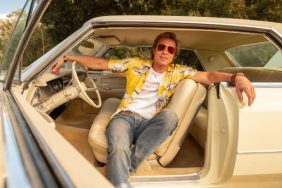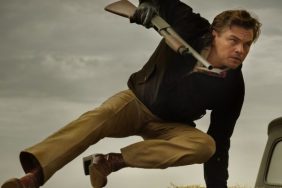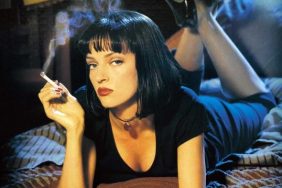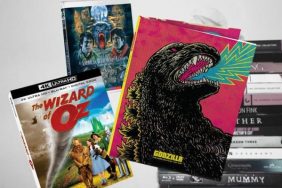The 1990s were, as has been said numerous times in SoundTreks, the golden era of the soundtrack record. Soundtracks sold heartily, and in many cases were far better than the movies they accompanied. (We’ll get to the soundtracks for Dead Man on Campus and the 1998 Godzilla eventually.) But the peak year for soundtracks within the 1990s was probably 1994, which saw the release of Clerks, Forrest Gump, Reality Bites, The Crow, Interview with the Vampire, The Lion King, Natural Born Killers, Fresh, and, of course, Pulp Fiction.
Check Out: SoundTreks | Twilight
It’s hard to describe the way Quentin Tarantino’s Pulp Fiction crept through pop culture in 1994. Here was a brutally violent film, peppered with a new odd version of casual patois, that somehow became one of the biggest – and most critically acclaimed – hits of the year. Films to meet the mainstream weren’t this casually violent before (people commit murder and then turn around and continue their conversation), and they never played so fast and loose with classical filmmaking structure (it is famously told out of chronological order). The release of Pulp Fiction was a watershed moment in American movies, and this film came to – in many ways – represent the decade’s cinema.
And, of course, the hit soundtrack record dominated just as vocally as the film. There was a time when the Pulp Fiction soundtrack was standard suburban issue for high school kids, and it was more widely distributed than even something like Awesome Mix Vol. 1 (which SoundTreks will also get to eventually). The songs from this record permeated my generation’s ears, and the songs became so strongly associated with the film, that some of them are now inextricably linked with the film, and with the ’90s.
Let’s take a look:
Track 1. “Misirlou” – Dick Dale & His Del-Tones
This loud, aggressive, awesome surf tune from 1962 acts as the movie’s theme, and it has since become The Pulp Fiction Song. There is no way to listen to this rendition of “Misirlou” any longer and not think of Tarantino’s movie. This phenomenon is, perhaps, the crowning achievement of any music supervisor; choose a song so striking and iconic – yet previously obscure – that the film comes to claim it, and it the film. “Misirlou” was just one of thousands of wonderfully groovy trash guitar surf instrumentals to come out of the 1960s (seriously, there were mountains of those things), but it’s notable for its virtuoso guitar work and vaguely punk underpinnings. It’s awesome. It was born in 1962, but it was given life in 1994.
A little background: “Misirlou” is actually a rather old folk song from the eastern Mediterranean, and recordings of it go back as far as 1919. It’s a melody that has come to infuse Jewish klezmer music, Arabian music, and other cultures as well. I think its true origins still lie in mystery. The best version is, still, however, Martin Denny’s 1960 rendition with the chimes.
Track 3. “Jungle Boogie” – Kool & The Gang
“Jungle Boogie,” from 1973, is the secondary theme song to Pulp Fiction, and we’re beginning to establish a tone. This film is going to be about nostalgia, but tough nostalgia. We’re going to be looking at a soundtrack record constructed almost entirely of hits from 2o-40 years previous, but we’re not going to use them to give ourselves pretty, watercolor memories of a bygone era. We’re going to dig up the slickest grooves and declare that Pulp Fiction, while taking place in the present, is supposed to feel like the past. It doesn’t bear the story or character signifiers of older movies – the flick is, in fact, aggressively modern – but the music and the visual references are meant to evoke the ultra-masculine violence fests of decades past. The 1980s are over. Let’s use the freedom of the 1990s to remind people of what was so great about the 1970s.
“Jungle Boogie” is funky like few songs are funky. Oddly enough, though, it sounds like a novelty tune. It’s full regimen of lyrics consist of nothing but “Get down jungle boogie.” Push it a little further, and this could have been as silly as, say, “Surfin’ Bird.”
Track 4. “Let’s Stay Together” – Al Green
“Let’s Stay Together” may seem like a gimme to put on a soundtrack record, too often used by music supervisors to punctuate either suave relaxation or extreme romance, depending on what’s going on in the scene. Know, though, that Pulp Fiction was the first, or at least among the first, to exploit Al Green. This went on to be featured in limp early 2000s rom-coms like How to Lose a Guy in 10 Days, Jersey Girl, and Down to You.
Let’s start a game. Let’s see if we can guess what year Pulp Fiction takes place in, judging solely by its soundtrack. “Let’s Stay Together” is from 1971.
Track 5. “Bustin’ Surfboards” – The Tornadoes
Quentin Tarantino is clearly a big fan of surf rock and surf instrumentals. I can’t say I blame him, as no form of music manages to be perfectly balanced between dance, rock, and 100% mood. It’s the collision of rock ‘n’ roll and lounge. It can be energetic party music, or laidback chill music. The Tornadoes’ “Bustin’ Surfboards” is a serviceable and pretty good surf track, but it can be swapped out for one of the thousands of its peers without too much tragedy. This one is from 1962.
Although we’ve had tracks from later, I’m beginning to think that Pulp Fiction takes place in 1971, and is set in L.A. (Of course it is set in L.A., but the surf music underlines that fact on the soundtrack.)
Track 6. “Lonesome Town” – Ricky Nelson
An odd thing happens to some ultra-sappy love ballads form the 1950s like “Lonesome Town.” They go through a period where they are derided and ignored by the hipper youngsters, who deem such music to be too square or drippy. They remain fallow and mocked for decades. But when enough time passes, they are resurrected and given a chance to be reconsidered through the prism of history. “Lonesome Town” is not something one can perhaps enjoy without recognizing its distance from the present.
I’ve seen this happen to movies a lot.
Track 7. “Son of a Preacher Man” – Dusty Springfield
I think this was only one track on this record (of two) that I knew before Pulp Fiction was released. We used to sing our own parody lyrics: “The only boy who could ever feed me was the son of a pizza man.” And we’d yuk and yuk and yuk.
We were kind of idiots.
This tender little groove is from 1968. I don’t think I can add anything to it with commentary.
Track 8. “Bullwinkle, Part II” – The Centurions
It should most certainly be noted that the Pulp Fiction soundtrack is punctuated throughout by snippets of dialogue from the film. This was a common practice with soundtrack records of the 1990s, notably for the OSTs for Clerks and Natural Born Killers.
I like this practice. It not only allows the soundtrack record to fold more directly into the film, allowing the moods of both to more forcefully overlap, but it also highlights something that seems lost from a lot of modern screenwriting: a distinct voice. Certain screenwriters and filmmakers make movies with characters that speak in a very distinct way; you can spot who wrote something through the dialogue alone. Tarantino is one of those filmmakers. Kevin Smith, David Mamet, Neil LaBute, and John Waters are others. When a soundtrack features seemingly random snippets of dialogue, it’s like a sweet little Whitman’s sampler of what the screenwriter did in the movie.
“Bullwinkle” is another wicked surf tune. It comes from 1962. I’m beginning to think Pulp Fiction may take place a little earlier. Maybe 1969.
Track 9. “You Never Can Tell” – Chuck Berry
Chuck Berry is the godfather of rock and roll. If you don’t know Chuck Berry, learn. If you do, then you’re human.
Here’s something that’s always bugged me: This song is used incorrectly in the context of Pulp Fiction. When Mia (Uma Thurman) and Vincent (John Travolta) go on a friendly date to a ’50s-themed diner, they enter a twist competition, and dance to “You Never Can Tell.” First off, The Twist, as a dance craze, didn’t begin until 1960 when Chubby Checker covered “The Twist” (although the song was written some years before). Secondly, if you’re going to do the Twist, you would not do it to “You Never Can Tell.” This is not a Twist song. No one in the 1950s or the 1960s danced The Twist to “You Never Can Tell.” Which, by the way, was released in 1964. Played in a ’50s diner.
Check your facts, troll.
Track 10. “Girl, You’ll Be a Woman Soon” – Urge Overkill
This is one of the the only new songs on the record. “Girl, You’ll Be a Woman Soon” is a Neil Diamond song from 1967, but this version of it is a cover by the alterna-rock band Urge Overkill, who recorded it in 1993. I prefer this version, although this is another one of those songs that I too strongly associate with the film, and largely enjoy listening to because it’s so evocative of my experience watching Pulp Fiction.
Although this song does have the aural earmarks of something recorded in the ’90s, you would be forgiven for thinking it came out earlier. Even with the updated sound, this track has a timeless quality. So, despite the anachronism, Pulp Fiction could still have taken place in the late 1960s.
Track 11. “If Love is a Red Dress (Hang Me in Rags)” – Maria McKee
Despite the country/rockabilly twang to the guitar, this Maria McKee song is unmistakably from the present. This is an aching ’90s song of defiance laid over an older format. It’s great, don’t get me wrong, but it’s the first time we’re hearing something that’s not deliberately trying to stir up the rockin’ past. Mostly due to McKee’s vocals, which have the rough-hewn-hands quality of other ’90s chanteuses. It’s also the mellowest, sweetest track on the record, and, oddly enough, the most emotionally genuine. Odd that Maria McKee isn’t a household name thanks to this soundtrack, and this song is rarely referenced today.
Track 12. “Comanche” – The Revels
From 1964, this is an aggressive jazz riff that accompanies an on-screen rape. This is a groovy tune on its own, but there’s something sweaty about that aggressive tenor saxophone. If you’re going to depict a horrid act, this track punctuates it surprisingly well.
Track 13. “Flowers on the Wall” – The Statler Brothers
This was the other track I knew before the movie. I’m not sure what to make of it, even though I’ve been hearing “Flowers on the Wall” my whole life. It’s a silly little ditty, but it’s not really funny enough to be a comedy record; it wouldn’t have played on The Dr. Demento Show, for instance.
But I still heard it on the radio when I was a child, on both the oldies stations (it was released in 1966) as well as the contemporary stations. I have a distinct memory of twice hearing this song back-to-back on the radio with Hall & Oats’ 1982 hit “Maneater.” Although maybe my brain is wrong. “Flowers on the Wall,” in the context of the movie, plays that same function. It’s just a goofy song that Butch (Bruce Willis) is listening to while driving around town. “Flowers on the Wall” is an invader. A song that fits no mood, and is used to break things apart. It still has that power.
Track 15. “Surf Rider” – The Lively Ones
This is the track that plays over the film’s credits, and pretty much – at least in my ear – cements my notion that Pulp Fiction is set in the late 1960s or very early 1970s. This is a surf track from 1963, and The Lively Ones were one of the bigger surf acts from the time; Del-Fi Records re-issued a lot of The Lively Ones’ stuff on CD in the 1990s, largely because of the popularity of Pulp Fiction. Indeed, there was a miniature surf renaissance in the 1990s thanks to the Pulp Fiction soundtrack. Although “Misirlou” is the surf champ of the record, I would say that, if you want to get into vintage surf, start with The Lively Ones.
Which is Better? The Soundtrack or the Movie?

Miramax
The movie is a classic, and cannot be touched. Despite the snippits of dialogue, the whole mood is not captured by the soundtrack. Indeed, the soundtrack conveys something far less aggressive than the movie. There’s plenty of aggression, but the film’s violence is not on the soundtrack (see the Natural Born Killers OST for something violent in soundtrack form).
The soundtrack, when taken as an individual animal, is a memory trip dragged assertively into the present. These are not dusty old hits, but a definition of a character. This is what 1969 felt like, but it’s also what the present can feel like. There is a level of passion on this record that outstrips mere nostalgia. “Cool,” this record argues, is an eternal concept, and free of contemporary prejudices. Surf was cool then, and it’s still cool. Cool is for everyone, and it’s always been flowing freely from these sources. Just tune in to get some.
Quentin Tarantino was born in 1963. Perhaps he discovered this “cool” when he was nine, ten, eleven, or twelve, and has been trying to share it ever since. It’s worthy of analysis.
Top Image: MCA
Witney Seibold is a contributor to the CraveOnline Film Channel, and co-host of The B-Movies Podcast. You can follow him on “Twitter” at @WitneySeibold, where he is slowly losing his mind.





















